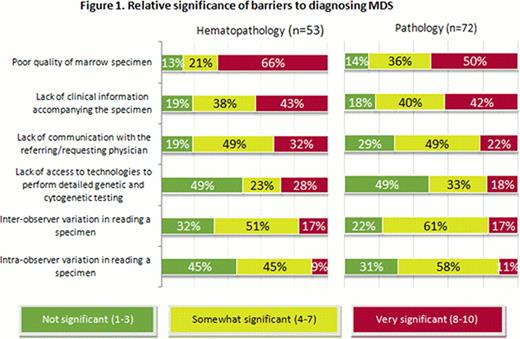Abstract
Abstract 4242
MDS are a heterogeneous group of hematopoietic stem cell disorders whose incidence appears to be increasing. Establishing the diagnosis of MDS requires careful morphologic review of the peripheral blood, bone marrow (BM) aspirate and biopsy and correlation with clinical findings. The role of the pathologist in the diagnosis of MDS is vital. The purpose of this study was to describe current practice patterns and barriers facing both general pathologists and hematopathologists regarding the diagnosis of MDS and to identify areas for continuing education for all pathologists who diagnose MDS.
The study used several methods to collect data including literature review, nominal group technique focus groups, and a case based survey. The survey was distributed during March and April 2012 via fax and email to 5,490 general pathologists and hematopathologists practicing in the US. Responses were received from 233 general pathologists and hematopathologists, of which 130 completed the survey. A final sample of 72 general pathologists and 53 hematopathologists were used in the analysis, giving a response rate of 2.3%. Respondents to the survey were given a small remuneration for their time.
As expected, experience with MDS was higher in hematopathologists than general pathologists. Hematopathologists evaluated an average of nine BM aspirates and biopsies per week, whereas general pathologists evaluated an average of 2 per week. Confidence in aspects of MDS diagnosis was also higher among hematopathologists, with 76% being very confident in their ability to classify and report MDS (vs. 33% of general pathologists) and 79% very confident in distinguishing MDS from other hematopoietic disorders (vs. 39% of general pathologists).
Regarding general practice patterns, the majority of both groups requires and reviews clinical data for every hematology case (77% hematopathologists, 79% general pathologists). Both groups cited poor quality bone marrow specimens as a much more significant barrier than lack of clinical information or access to technology (fig 1). Only a subset of both groups reported having standardized protocols in their institution for the diagnosis and work-up of MDS (36% hematopathologists and 32% general pathologists). The hematopathologists more frequently had a checklist in place for clinicians to ensure that sufficient and appropriate samples are collected at the time of bone marrow biopsy (62% versus 39% for general pathologists). Most general pathologists (63%) and hematopathologists (55%) do not use the International Prognostic Scoring System (IPSS). Accordingly, most are not aware of the components that comprise the IPSS.
The case based survey showed some practice similarities and differences between the groups. The vast majority of both hematopathologists and general pathologists use the current WHO (2008) classification system (96% hematopathologists and 92% general pathologists). The most obvious difference between the groups was in ordering FISH testing for possible MDS. Among those who selected FISH in the hematopathology group, greater than 90% selected probes for chromosomes 5, 7, 8 and 20. There was greater variability in the probes ordered by general pathologists. Most notably chromosome 8 was selected by 58% of general pathologists and BCR-ABL was selected by 29% of general pathologists (vs. 8% in the hematopathologists group).
The results of the study suggest there are continuing education opportunities for these pathologists to ensure more standardized diagnostic evaluation for MDS. The need for more standardized protocols for the work-up of patients for MDS was voiced by both general pathologists and hematopathologists. Pathologists may also benefit from more clinically oriented continuing education, to include topics such as the International Prognostic Scoring System (IPSS) and other validated prognostic classification systems.
Sagatys:CE Outcomes, LLC: Consultancy. Berger:Celgene Corporation: Celgene Stock Other, Employment. Merwin:Patti Merwin: Company Stock Other, Employment. Sugrue:Celgene Corporation: Employment, Equity Ownership.
Author notes
Asterisk with author names denotes non-ASH members.


This feature is available to Subscribers Only
Sign In or Create an Account Close Modal